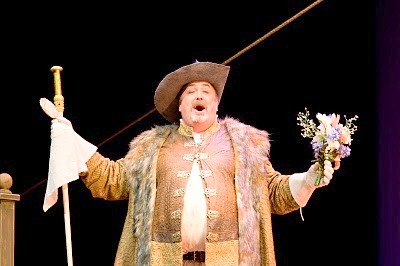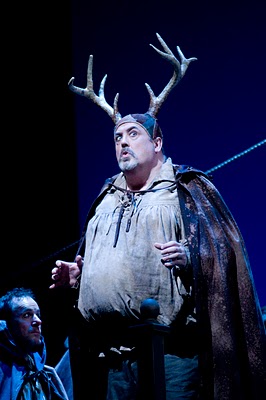 Giuseppe Verdi's final opera, Falstaff, composed when he was 80, has no great melodic lines, triumphal marches or consumptive heroines; at its center there is only a drunken old man who imagines himself a seducer. Falstaff's lack of self-awareness permeates the opera and gives it broad brushes of comedy. Handsome once, he has grown grotesque and fat, yet not without wit ("I am in the waist two yards about; but I am now about no waste; I am about thrift"--and "If Falstaff were thin, no one would love him"). He behaves like a boor; oblivious to his own hypocriscy, and lectures his servants about "honor."
Giuseppe Verdi's final opera, Falstaff, composed when he was 80, has no great melodic lines, triumphal marches or consumptive heroines; at its center there is only a drunken old man who imagines himself a seducer. Falstaff's lack of self-awareness permeates the opera and gives it broad brushes of comedy. Handsome once, he has grown grotesque and fat, yet not without wit ("I am in the waist two yards about; but I am now about no waste; I am about thrift"--and "If Falstaff were thin, no one would love him"). He behaves like a boor; oblivious to his own hypocriscy, and lectures his servants about "honor."
 It's Verdi's only comic opera, based on Shakespeare (mostly The Merry Wives of Windsor, with bits of Falstaff's character adapted from the Henry plays), and it uses sprightly.language and brilliant orchestration to tell the story or Falstaff's comeuppance.
It's Verdi's only comic opera, based on Shakespeare (mostly The Merry Wives of Windsor, with bits of Falstaff's character adapted from the Henry plays), and it uses sprightly.language and brilliant orchestration to tell the story or Falstaff's comeuppance.
The current Seattle Opera production is homegrown. Originally designed by Peter Kazaras three years ago for the company's Young Artists program, it migrated to Los Angeles and Cleveland before returning to Seattle, where the set needed only a slight stretch to span the proscenium at McCaw. It's a stylized version of the Globe in London, with a raked stage bordered by bleachers, where the singers retreat when they're not performing. In the third act, a cantilevered cloud of chairs descends to create a stylized forest.
As always Jonathan Dean's supratitles capture the essence of the Italian libretto, often returning to Shakespeare's original language for the perfect couplet. Under Riccardo Frizza's deft baton, the orchestra sounds like they're playing Mozart. Indeed Kazaras directed Seattle's staging of Marriage of Figaro last year with several similar scenes of letter-reading and singing at cross-purpose.
Peter Rose, whose previous appearance at McCaw was as a randy Baron Ochs in Rosenkavalier, triumphs in the title role, a sympathetic character despite his considerable flaws, surely not deserving of "death by a volley of turnips" but saved from drowning by his own swollen belly.
There's no curtain; the performers arrive in street clothes and change into costume in full view of the audience. Stephanie Blythe waves to her fans; Doug Jones is on a cellphone, Peter Rose puts on a preposterous fat suit (shades of Pagliacci's "Vesti la giuba"). And when all is said and sung (Falstaff properly humiliated and chastened, "I do begin to perceive that I am made an ass"), he leads them all in a cheerful chorus, "Tutti gabbati," Hah-hah, it was all a put-on! He who laughs last, laughs best.
It's the perfect opera for self-doubting Seattle in these angst-ridden times, full of linguistic curlicues and wink-&-nod references that we're all in on the joke.
Seattle Opera presents Falstaff at McCaw Hall through March 13, For tickets ($25-$168), call 206-623-0800 or go online..
Seattle Opera photos © Rosarii Lynch.
Leave a comment